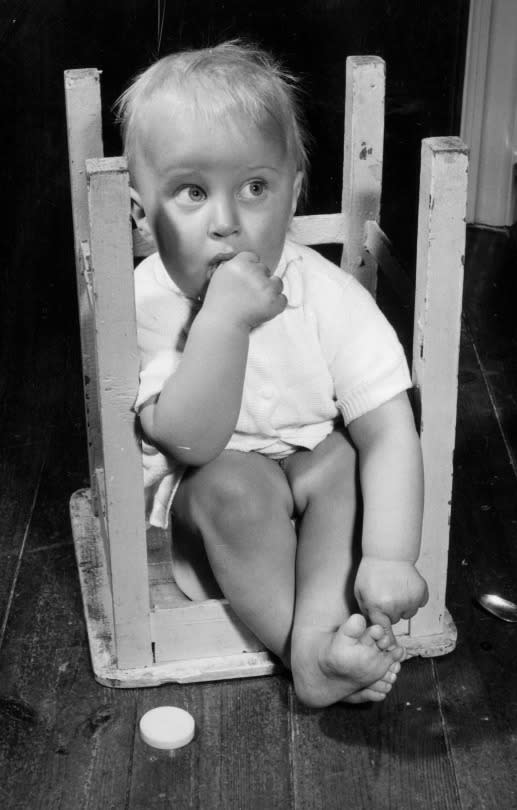Should You Make Your Child Stop Sucking His Thumb? The Great Debate

Thumb-sucking can start as early as when babies in the womb and often continues for several years. And while the is a hard-to-break habit, it also helps little ones calm down and comfort themselves when they’re upset or anxious. It can also feeling relaxing, which may make it easier for them to fall asleep.
Most children eventually outgrow sucking their thumb, dropping it on their own, but if your preschooler is still going strong should make him stop? If so, what are the best ways to get them to drop the habit?
The Research
It’s no surprise that thumb-sucking is a popular habit with little ones. One study found that almost 90 percent of infants suck their thumb or fingers at just two months old. Other research found that up to 46 percent of children ages one to four years old suck on their thumb or other finger.
STORY: Should You Have Kids? The Great Debate
Most children stop sucking their thumb on their own between the ages of two and four, according to the American Dental Association (ADA). In some cases, they stop because of peer pressure and self-consciousness over sucking their thumb at school.
STORY: Should You Be a Working or Stay-at-Home Parent? The Great Debate
What the Experts Say
“Even when the habit lingers past infancy, thumb-sucking is rarely something to be concerned about,” Sabine Hack, a psychiatrist in New York City, told WebMD. “It doesn’t indicate that a child has emotional problems or that he will still be sucking his finger when he’s a teenager.”
That said, the ADA recommends that parents discourage thumb-sucking after age four if it’s vigorous (actively sucking versus passively keeping a finger in their mouth) to avoid damaging teeth and roof of a child’s mouth. However, the ADA doesn’t advocate putting excessive pressure on a child to stop, noting that it can do more harm than good.

Instead, the ADA recommends praising your child when he’s not sucking his thumb, instead of scolding him when he is. The organization also suggests finding other ways to comfort a child — or helping them find new ways to calm themselves, such as squeezing a favorite toy — when they’re upset. Rewarding a child when she doesn’t reach for her thumb when she’s upset, is another method.
Pediatrician William Sears recommends diverting your little one’s attention elsewhere: “The time-honored way of breaking any annoying or harmful habit is ‘distract and substitute,’” he told Parenting magazine. “As soon as you see the thumb going toward the mouth, quickly distract your child into a hands-on activity or insert a toy into both hands.”
If those strategies don’t work, the ADA also suggests putting a bandage around thumb or a clean sock over your child’s thumb-sucking hand at night to make it harder to keep up the behavior.
What the Parents Say
"My daughter didn’t suck her thumb, but I myself was a huge thumb-sucker when I was little, so much so that my mom threatened me with putting a foul-tasting substance on my thumb to make me stop. I was so afraid of that I started sleeping with my thumb tightly clenched in my fist. To this day, I still curl my thumb under my fingers when I sleep.” —Stephanie K.
“Our son sucked his thumb until he was almost nine. Between ages five to eight years old, my wife and I tried talking him out of sucking his thumb. That went nowhere. We finally relented and figured, ‘Hey, nobody graduates from colleague with their thumb in their mouth.’ When his favorite teddy bear that he’d had since birth gave out, so did the thumb sucking. Today, at 10, his teeth are perfect. I’m glad I never made him feel less-than for sucking his thumb. It’s really not a big deal in the scheme of things.” —Jason M.
“My daughter sucked her thumb well beyond first grade. I didn’t do anything to stop it, as it was such a source of comfort. I think when someone is ready to stop, they do.” —Susan B.
The Bottom Line
Let thumb-sucking run its course, unless your child’s dentist recommends otherwise or if your child is four years or older and sucks her thumb vigorously. To help your child back off the habit, praise and reward them, such as giving them special stickers, when they’re not sucking their thumb, rather than criticizing or punishing them when they are. You can also enlist the help of your pediatric dentist to talk to your child about why thumb-sucking can be harmful to his or her teeth. —Rachel Grumman Bender
(Photo: Getty Images)

